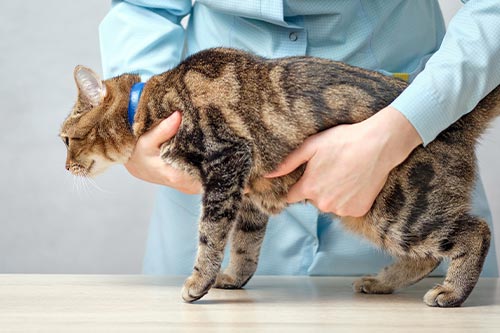Cat Swollen Belly: What Could a Swollen Belly Mean?
A swollen belly in your cat can be a sign of various health concerns, ranging from minor issues to more serious conditions. Understanding why your cat’s abdomen is swollen can help you determine when it’s time to contact your veterinarian. At Lagniappe Animal Hospital, we recommend that you call us at (318) 255-3303 if you notice your cat’s belly appears larger than usual. Early detection and professional care can make a significant difference in addressing your cat’s needs.

Causes of a Swollen Belly in Cats
A swollen belly in cats can occur for several reasons. Some are simple, like overeating or gas, while others may require urgent veterinary attention. Here are some common causes that could lead to your cat’s belly looking enlarged.
Overeating or Obesity
One of the most common reasons for a cat’s swollen belly is overeating or obesity. Just like humans, cats can gain weight if they eat more calories than they burn. Over time, this can lead to a noticeable roundness in the abdomen. It’s important to monitor your cat’s diet and activity levels to ensure they maintain a healthy weight.
If your cat’s belly appears to be swelling gradually over time and they’re less active, weight gain could be the cause. Obesity in cats can lead to other health concerns, such as diabetes, joint problems, and heart disease. If you’re unsure about how much to feed your cat, we can help you develop a healthy feeding plan that meets their needs.
Bloating from Gas
Gas buildup is another reason your cat’s belly may look swollen. Bloating in cats is usually temporary and can result from eating too fast or swallowing air during meals. While this condition typically resolves on its own, consistent or painful bloating may indicate an underlying digestive issue that needs veterinary attention.
If your cat’s belly feels tight or they seem uncomfortable, this could be a sign that the bloating is causing discomfort. In some cases, chronic bloating may suggest that your cat has a food sensitivity or intolerance. If your cat’s bloating doesn’t go away, it’s a good idea to call us for further advice.
Fluid Buildup
Fluid buildup, or ascites, in a cat’s abdomen can cause their belly to look significantly larger. This is often a sign of a more serious underlying condition, such as heart disease, liver problems, or cancer. If you notice that your cat’s belly has become swollen quickly or appears to sag with a fluid-like consistency, you should seek veterinary care immediately.
Fluid buildup can make your cat feel lethargic, uncomfortable, and may affect their appetite. Since this symptom is linked to several serious conditions, diagnosing the root cause as soon as possible is essential. We can perform the necessary diagnostic tests to pinpoint the cause of the fluid accumulation.
Parasites
Internal parasites, such as worms, can cause a cat’s belly to swell, particularly in kittens. Roundworms and tapeworms are common culprits that can lead to abdominal distension. If your cat’s belly looks round and firm and they’re showing other symptoms like vomiting, diarrhea, or weight loss, it’s possible they have a parasitic infection.
Routine deworming and regular fecal exams are the best ways to prevent and treat parasitic infections in cats. If you suspect your cat may have worms, bring them in for a checkup so we can provide appropriate treatment.
Organ Enlargement
An enlarged organ, such as the liver, spleen, or kidneys, can cause a noticeable increase in belly size. This could indicate a range of issues, from infections to tumors. Cats with organ enlargement may also display symptoms like lethargy, weight loss, vomiting, or changes in their eating habits.
If your cat’s belly appears swollen and they show other signs of illness, a thorough examination is necessary. We can use imaging techniques, like X-rays or ultrasound, to evaluate your cat’s internal organs and determine whether an enlargement is present.
Pregnancy
For female cats, pregnancy is a common cause of abdominal swelling. A pregnant cat’s belly will gradually become larger as her kittens grow. If you suspect your cat is pregnant, you might also notice behavioral changes such as increased affection, nesting behaviors, and changes in appetite.
It’s important to schedule a vet visit if you think your cat may be expecting. We can confirm the pregnancy and provide guidance on how to care for your cat during this time.
Feline Infectious Peritonitis (FIP)
Feline Infectious Peritonitis (FIP) is a viral disease that can cause fluid to build up in the belly, leading to significant swelling. Unfortunately, FIP is a severe condition that is often fatal. Cats with FIP may also experience symptoms like fever, weight loss, and breathing difficulties.
If your cat shows signs of FIP, including a swollen belly, it’s essential to bring them to the vet for testing and supportive care. While there’s no cure for FIP, we can help manage the symptoms to keep your cat as comfortable as possible.
When to Contact the Vet for a Swollen Belly
A swollen belly in cats shouldn’t be ignored, especially if the swelling appears suddenly or is accompanied by other symptoms. If your cat is showing any of the following signs along with a swollen abdomen, you should contact us at Lagniappe Animal Hospital immediately:
- Vomiting or diarrhea
- Lethargy or weakness
- Loss of appetite
- Difficulty breathing
- Pain when touched
- Rapid weight gain or loss
These symptoms could indicate a more serious underlying problem that requires professional care. Early intervention is key in ensuring the best outcome for your cat’s health. We’re here to provide the diagnostic testing and treatments your cat may need.
How We Diagnose and Treat a Swollen Belly in Cats
At Lagniappe Animal Hospital, we begin by performing a physical examination of your cat and discussing their symptoms. Depending on the findings, we may recommend further diagnostic tests such as bloodwork, X-rays, or ultrasound to determine the cause of the swelling.
Once we have a diagnosis, we’ll discuss the best course of treatment. This could range from simple dietary changes for mild issues like bloating or obesity to more advanced treatments if a serious condition like heart disease or FIP is found.
Our goal is to provide compassionate care and help your cat feel better as quickly as possible. Whether your cat’s swollen belly is a minor concern or a more serious issue, we’ll work with you to develop a plan that meets their needs.
Keep an Eye on Your Cat’s Health
A swollen belly can be a sign that something isn’t quite right with your cat’s health. By staying aware of changes in their appearance and behavior, you can help catch potential problems early. If you’re unsure whether your cat’s belly looks larger than usual, it’s always a good idea to get a professional opinion. Our team at Lagniappe Animal Hospital is here to answer your questions and provide the care your cat deserves.
To schedule an appointment or learn more about your cat’s health, call us at (318) 255-3303 today. We’re happy to help you with any concerns you may have about your cat’s swollen belly or other health issues.

